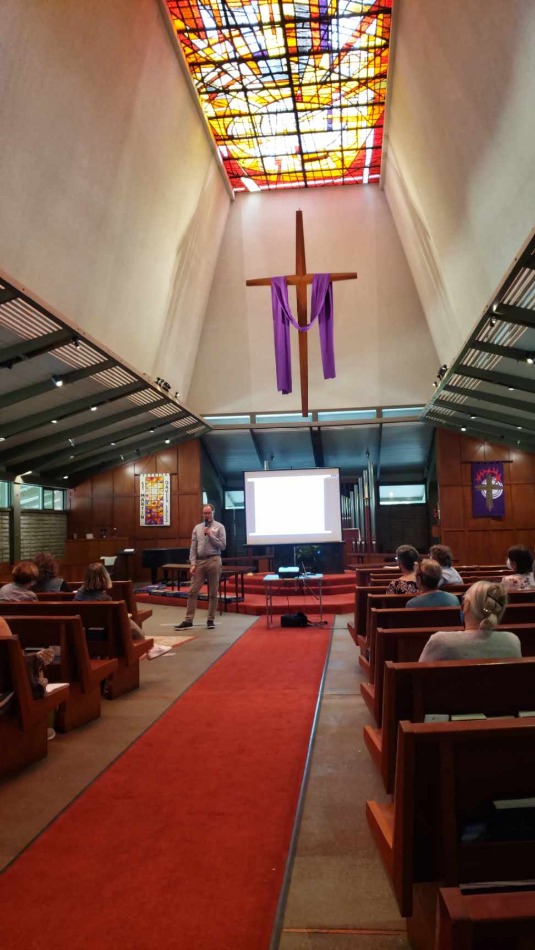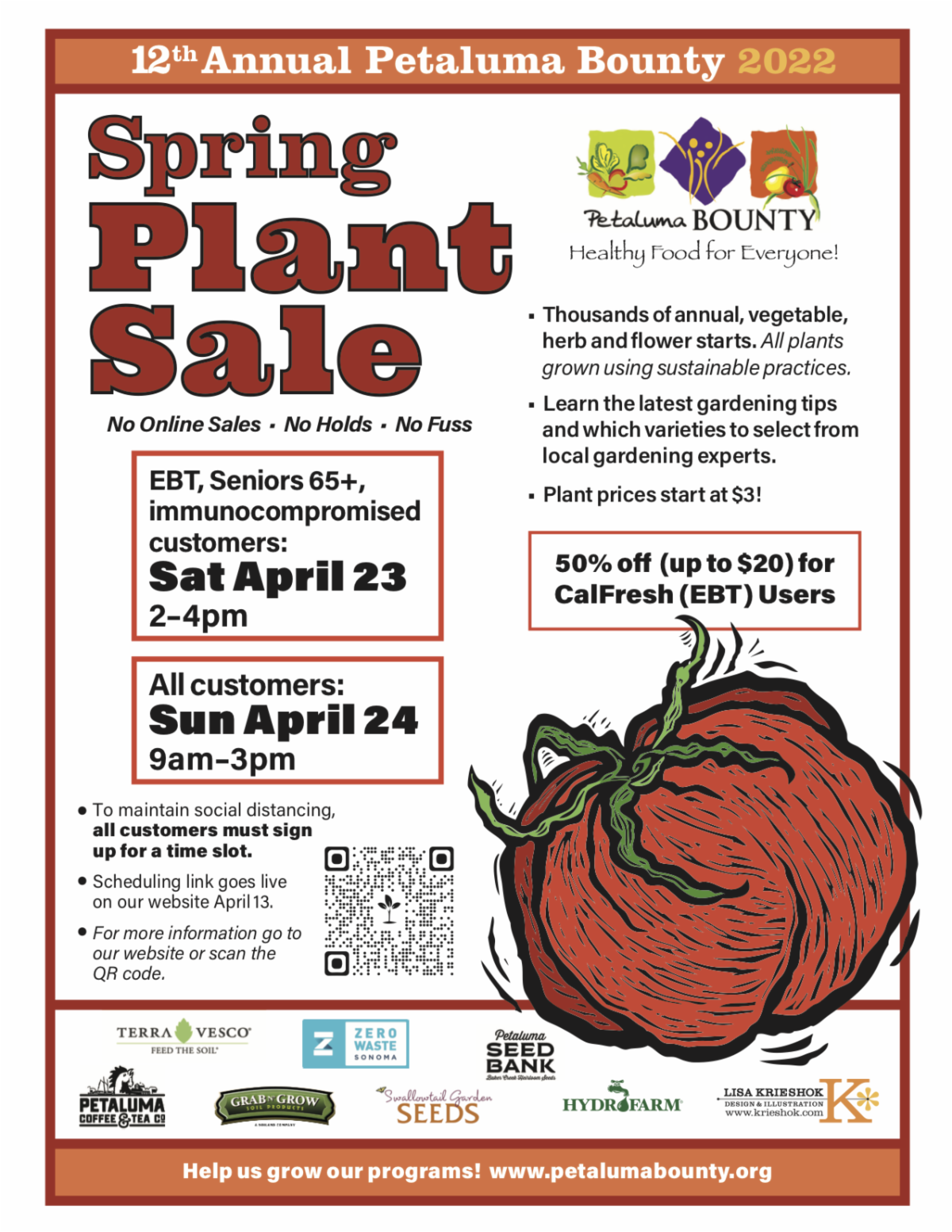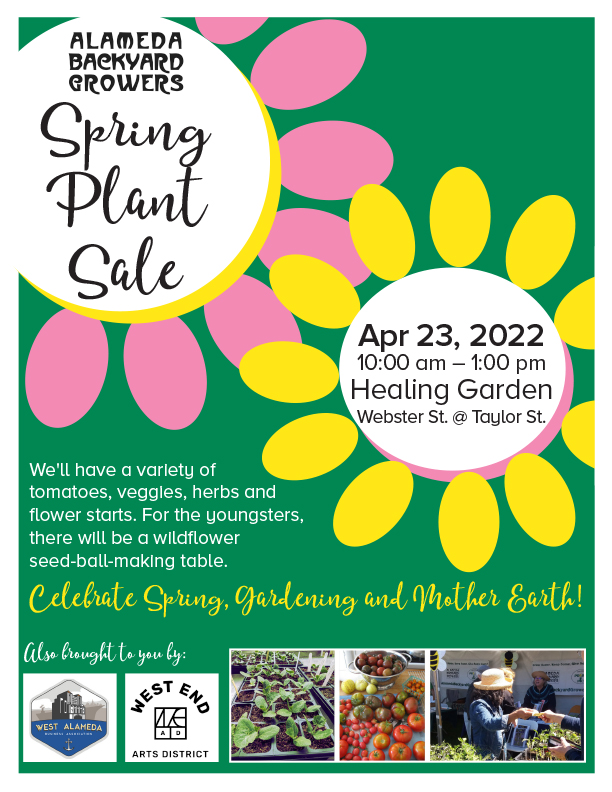| This Weekend, Muslims continue to celebrate Ramadan, Jews prepare for Passover, and Christians will celebrate Easter! We hope your holidays are enjoyable and peaceful! April Newsletter Contents ~ Growing Faith, Food, Community: Episcopal Church Gardens Conference ~ East Bay Event May 7th: Hill Top Gardening Workshop ~ Access Links to USDA Workshops ~ Upcoming Events Calendar |
|
Growing Faith, Food, Community |
|
|
|  | Steve Schwartz discusses the Faithlands project at St. Martin's Church in Davis, April 2nd. |
| The Interfaith Food Team toured St. Stephen’s Episcopal Church in Sebastopol on Wednesday, March 30. Agrarian Ministry consultant Brian Sellers-Peterson toured many church gardens in preparation for the Growing Faith, Food, and Community Conference of the Episcopal Diocese on April 2nd. Members of fourteen congregations from around the Episcopal Diocese of Northern California gathered at St. Martin’s in Davis to discuss church gardens. The Bishop Megan McClure Traquair commenced the day with reflections on her blossoming passion for gardening. The Rev. Pamela Dolan welcomed everyone. Participants were mostly leaders in the Episcopal community who had flourishing church gardens or were seeking ideas and advice on how to start a faith-based food justice project. The keynote speaker was churchwide agrarian ministry consultant Brian Sellers Petersen, who discussed the Good News Gardens initiative and the importance of the garden as a space where all of Creation and godliness can be found. Jim Schaal, Executive Director of the Center at St. Matthew’s in Sacramento, shared theological reflections on urban community gardening through photos of a project in Chicago. Deacon Phina Borgeson, Advisory Board member, asked congregations, “What is one key thing that has contributed to your garden’s thriving?” as well as what would be a sure contribution to their success for those beginning gardens. The most common responses were: people within the congregation, community partners with expertise, and land. When asked about challenges they faced, people, such as volunteers within the congregation and advice from other congregations, were again mentioned most often. As Sellers-Petersen was heard to comment while traveling the diocese to visit congregation-based projects, “Community garden is 80% community and 20% garden.” A discussion of the viability of projects long-term centers around who is willing to cultivate the project, organize volunteers, and ensure the engagement is maintained. Paige Hotchkiss-Needleman, Program Associate, suggested congregations check community gardening waitlists, reach out to local schools, and assess interest by residents proximal to the church for support while diocesan staff Julie Wakelee suggested small diocesan grant programs available to community gardens and similar projects. In the afternoon, Steve Schwartz and VISTA Megan Zywicz presented information and answered questions about the Faithlands project. Faithlands is a movement of a small number of groups around the country that are facilitating access to land owned by religious institutions for beginning and immigrant farmers. Interfaith Food hosted the 3-day National Faithlands Gathering in August 2021. Interfaith Food is inventorying lands owned by the Episcopal Diocese and other faith groups as these often underutilized lands can be a great resource for farmers. After each participant picked up their gift of an organic tomato start, the conference moved to Grace Garden at Davis United Methodist Church for a tour and closing meditation. |
| | 7th Annual Hilltop Gardening Workshop |
| For the first time, Interfaith Food is co-sponsoring the Seventh Annual Hilltop Gardening Workshop in the East Bay on May 7th. Be sure to check the schedule for Interfaith Food’s talk on nutrition education. This event is FREE and offers 27 different classes taught by master gardeners, professional horticulturists, and gardening enthusiasts. The classes are listed on the attached flier. Click this link: https://hilltopgardeningworkshop.sitelio.me/topics You’ll want to arrive early because the first 200 attendees will each receive 5 free strawberry plant starts. Interfaith Food will have seed packets from the Community Seed Exchange to give away. Many other freebies—gardening books, tools, pots, and plants—will be given out in a free raffle at the end of the workshop. This event is a community service sponsored by the Hilltop and Richmond Wards of The Church of Jesus Christ of Latter-day Saints, in partnership with the University of California Master Gardeners Program of Contra Costa County. Come say hello to the Interfaith Food team. We will have a table set up in the chapel where we’ll have garden related takeaway articles and fun give-aways. Details: Saturday, May 7th 2022 9:00 am to 12:45 pm Hilltop Chapel at 4351 Hilltop Drive, El Sobrante |
| Virtual Workshops Help Farmers Access USDA Resources |
| Interfaith Sustainable Food Collaborative organized and/or promoted two USDA Workshops in March. In partnership with USDA and EcoFarm Interfaith Food, on March 9, 2022 we hosted the workshop: “Accessing USDA Cash Assistance After Fires, Drought, and Winter Storms,” a free Workshop as part of the EcoFarm Conference. The workshop was designed to provide information to farmers who would otherwise be underserved by USDA programs including immigrant farmers. They helped demystify the application process and provided information on how farmers can be prepared by knowing what to document before disaster strikes. Farmers were able to go deep with Navdeep Dillon, Program Chief for FSA and Brooke Rafaele, Outreach Coordinator. EcoFarm arranged a translator who helped Spanish-speaking farmers connect with the FSA contacts during the one-on-one Q&A time at the end.
So what should farmers have ready if they want to cover losses? Farmers need a variety of documentation to support their claims. While this might seem tedious, this is what the USDA needs to be able to adequately consider a claim. Otherwise, how can they know if what you are saying is true or not? Having these documents ready before you meet with FSA will make it much easier. When you reach out to your local FSA office, you will need to register your farm. Emergency Preparedness Documents: Proof of Identity: Driver’s License, social security card Proof of Taxable Business Income: IRS EIN Number Proof of either ownership or land tenantship: Copy of recorder deed, survey plot, rental or lease agreement (can be informal, but must be written) Proof of Business: Articles of incorporation, trust and estate documents or partnership agreements Proof of Loss: Document everything you possibly can with narratives (dates) and photos of pre- and post- damage, damaged equipment, etc. so you have evidence. Annual filing of crop acreage report. Due January 30, 2023 for this year’s losses: apply to the Livestock Forage Program (LFP) which will subsidize losses associated with animal raising during drought conditions. ELAP covers costs on private land for grazing and stored food. Visit the FSA website to make an account today and learn about upcoming programs and deadlines. The Drought Assistance workshop targeted farmers and ranchers in Kern, Tulare, and Fresno counties. This workshop detailed the types of operations eligible for loans, insurance and loss coverage as well as the requirements. If this information is relevant to you, check it out here and type the passcode: =4UWa!m9. Thank you to everyone who assisted and participated. We hope these workshops can clarify the requirements of these programs. Click the links below to access. For the drought program link you will need a passcode March 23 Passcode: =4UWa!m9 |
| | | Events Calendar Interfaith Food will be at the Hilltop Gardening Workshop Hilltop Chapel 4351 Hilltop Drive, El Sobrante Saturday, May 7th 2022 9:00 am to 12:45 pm |
| St. Stephen’s Episcopal Church 500 Robinson Road Sebastopol, CA The Great Easter Vigil Sunday, April 17 5:45 am-7:15 am Weekly Gardening Volunteer Opportunities: Come tend to St. Stephen’s Seed to Soul Garden on Thursdays from 10-11:30am. Work parties for the Community Seed Exchange are Wednesdays from 4-5:30 pm. Learn to grow, adapt, and save your own seeds. |
| One World Ukrainian Relief Concert Hosted by the Sonoma Valley Interfaith Ministerial Association Friday, April 22 at 6:30 pm 252 West Spain Street, Sonoma ~Shared campus of the First Congregational Church of Sonoma and Congregation Shir Shalom Call (707) 996-1328 for details |
| |  |
East Bay The Fourth Annual AAUW Plant Sale Saturday, April 30 Over 600 beautiful plants grown by AAUW Alameda Branch Dirt Divas will be featured at this fundraiser. Two pickup locations.
Buy tickets and learn more here. 12500 Campus Drive, Oakland Saturday, April 23 9 am-4 pm
California Native Plant Society East Bay Chapter Announces the Return of In-Person Native Plant garden tours!
Visit the gardens below in-person on the 2022 Tour from 10:00-5:00:
* Bayside gardens will be open Saturday, April 30
* Inland gardens will be open Sunday, May Register below:
|
| |  | | |
|
| |
|
|